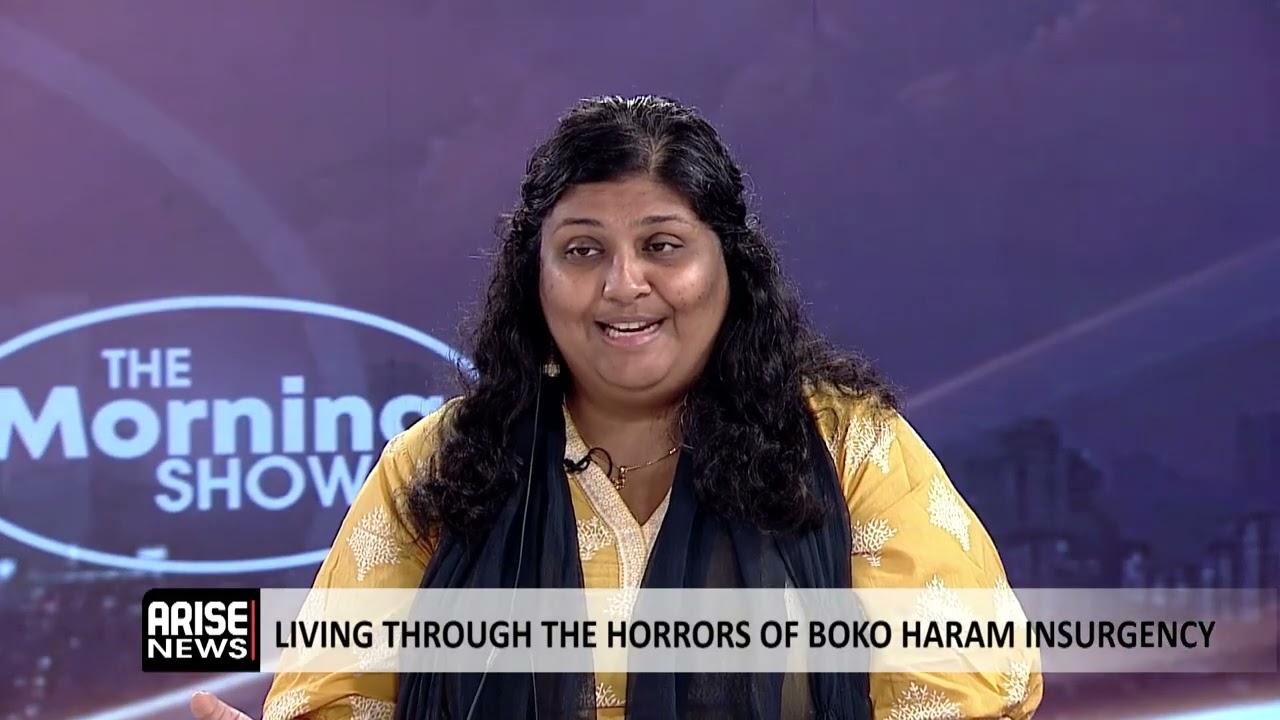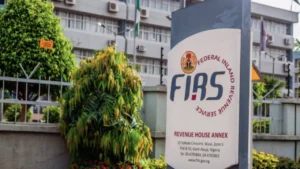
Human rights activist, journalist and researcher Chitra Nagarajan has called on Nigerians and policymakers to rethink how the Boko Haram conflict is remembered and recorded, stressing that many critical stories particularly those of ordinary citizens and women remain untold, saying that the country’s historical memory often privileges the voices of powerful men, leaving out those who lived through the violence and continue to bear its scars.
Speaking In an interview with ARISE NEWS on Saturday, Nagarajan discussed her new book, “The World Was in Our Hands,” which documents the experiences of hundreds of people affected by the insurgency across Nigeria’s northeast and the broader Lake Chad Basin region. The book, which she began writing while living in Maiduguri, brings together firsthand accounts of survival, courage, and loss.
“I decided to write The World Was in Our Hands while I was living and working in Maiduguri. And at the same time, I would be travelling to Abuja, Lagos, and other parts of Nigeria, and I saw such a disconnect between what I was experiencing in northeast Nigeria and some of the people I was working with and their stories and what the rest of the country knew about what was happening in northeast Nigeria and the Lake Chad Basin region. And at the same time, as I was living in Maiduguri, I was travelling around also to Chad, Cameroon, Niger as well.
And I really felt a responsibility to document what was happening in the Boko Haram conflict, not just for us living here today, but also for future generations. Because we know that history tends to be from the perspectives of the elites and elite men in particular. And yet at the same time, there was such a wealth of information of what was happening.”
She recounted meeting women who risked their lives to hide men from Boko Haram and smuggle them across borders to safety, fishermen who were attacked on Lake Chad, and civil servants whose livelihoods and families were destroyed by the violence. “Because we know that history tends to be from the perspectives of the elites and elite men in particular. And yet at the same time, there was such a wealth of information of what was happening. So for example, women who were hiding men in their houses to prevent them from being killed by Boko Haram, smuggling them across the border to Cameroon to safety, civil servants who were experiencing the impact of the conflict on their families and also their livelihoods, you know, fishermen who were being attacked on the lake, Lake Chad, and so many other stories as well. And I really wanted to document that so Nigerians knew what was happening in our own country, and also that future generations would know what their ancestors went through.”
On the Nigerian military, Nagarajan said the public conversation about soldiers has been very incomplete, noting that while some see soldiers only as heroes and others as perpetrators of human rights abuses, few people recognize the psychological and physical toll that years of conflict have taken on them.
“Many of them have been posted in northeast Nigeria, not just for months, but for years. So imagine living in the heat of conflict for two years, three years, four years, with very few breaks to come and see your families. In fact, many of them, their relationship with their family has really been affected. They don’t know their kids, their wives, they are not able to keep in regular contact with them, also because often they’re fighting in areas without network also, so they can’t even make simple phone calls. They’re under attack. The people that they’re fighting are not wearing uniforms. It’s very difficult to distinguish between who is an enemy and who is a civilian. So they see everybody as a threat. They see their comrades being killed right next to them. The level of battle trauma that they suffer is really immense. Many of them are experiencing really grave mental health issues. I can’t even call it post-traumatic stress disorder, because they’re still in the trauma.”
She urged the Nigerian government to do more to improve soldiers’ welfare, including better pay, living conditions, and mental health support.
“And there’s a lot more that I feel that the Nigerian government should do in terms of giving soldiers proper breaks, giving them proper pay and benefits, proper equipment, materials, but also really putting in place proper mental health support programmes as well.”
Nagarajan said that after interviewing more than 900 people, one of her key findings was that everyone in the region whether combatant, civilian, displaced person, or aid worker has been affected by the conflict.
“I mean, I always say that to some extent, everybody in northeast Nigeria, and unfortunately, conflict is not just limited to the northeast Nigeria, but we see also violence in many parts of northern Nigeria. And in every place where you see conflict and violence, I would actually say that everyone is, to some extent, a victim of what has happened. You see impacts on healthcare facilities, schools, you see impacts on livelihoods as well. And that’s just what the whole population is suffering, let alone people who experience direct violence, people who’ve seen their parents killed right in front of them, who’ve seen their children abducted, women who have been taken and have been forced into marriage and raped, men who have been killed and targeted for that. So you really see the way that everybody has experienced violence.”
She warned that while the Boko Haram conflict may no longer dominate national headlines, its consequences remain devastating. Many communities continue to suffer displacement, food insecurity, and trauma without adequate support for recovery. “I think one of the biggest issues is the violence is not over. The Boko Haram conflict may no longer really make the headlines in Nigeria in the same way that it did 10 years ago, but that doesn’t mean that people do not continue to suffer. And at the same time, there’s a lack of help in terms of trauma healing and helping people to move on. And again and again, we see people who try to rebuild their lives, who have found a place to farm, who have tried to plant and get crops, and then something happens like the rains or the floods. And even if it’s been two or three years that they’ve been managing to survive, all of that work just overnight goes back to zero. So I think there’s a lot more that we really need to be doing to support people go through the conflict and move on.”
Despite the hardship, Nagarajan said she was struck by the resilience of local communities, especially women, who continue to find ways to rebuild and support one another. “I would say that people are really trying. People are supporting themselves, supporting their families and supporting each other. If security is there and livelihoods are there, people are able to move on.”
Turning to gender, Nagarajan said that understanding the Boko Haram conflict requires examining how patriarchy and social inequality have shaped violence. She identified three key dimensions: the roles men and women play in conflict, the gendered impacts of violence, and the ways gender norms drive radicalisation.
“And so here we see, I mean, not to stereotype, but actually we see, largely speaking, most of the combatants tend to be men, definitely on the Nigerian military side, but also in terms of fighting on the Boko Haram side. Saying that, however, women play really important roles in driving conflict, but also driving peace. And so the roles that women play within Boko Haram are also really important. They have been recruiters, there have been people who’ve supported the group. And then also in the community militia groups, such as the Civilian Joint Task Force, you see women playing really important roles as well. So even though it’s true that the vast majority of people fighting are men, I think it’s also important to see the roles that women play in the conflict as well.”
She emphasised that both men and women have suffered violence because of gender expectations. “We know that the conflict has had impacts that are profoundly gendered. And here we tend to talk about women as victims of violence. And that’s very true. But we have to remember that men are victims too, and they’re victims because of their gender. So they have been attacked and targeted by all sides of the conflict. Boko Haram, when they came to communities, one of the things that they would do is go house to house and kill all the men and older boys. The military also, because of what I mentioned earlier, it’s very difficult to distinguish between who is the enemy and who is a civilian. There has been a tendency in various times in the history of the conflict for the military to go around communities who they see as all belonging to Boko Haram, engage in arbitrary arrest, also extrajudicial killings of men and boys.”
At the same time, women have borne immense burdens as caregivers and survivors.
“And at the same time, women and girls also suffer. Because many of the men have left to save themselves. They are missing, they’re in detention or they are fighting. Women are the ones who are having to look after themselves, their children, their elders, find ways to negotiate with men with guns for their safety, find ways to IDP camps, and then have to support themselves and their families and their community.”
Nagarajan also explored how gender inequality and frustration over social exclusion contributed to Boko Haram’s rise. She said the group’s early appeal lay in its promise to give young men and women status, belonging, and purpose in a system plagued by corruption and inequality.
“When Muhammad Yusuf was preaching in Maiduguri, he told young men that they could be respected without wealth,” she said. “He arranged inexpensive marriages, giving them social recognition in a society where status is tied to money and connections. For many, that message was powerful. Young women too were drawn in because Boko Haram offered them religious education and a sense of relevance that society denied them.”
Nagarajan concluded that Nigeria cannot fully move past the conflict without addressing the patriarchal structures and inequalities that fuel it. “One of the ways we need to move past the conflict is by addressing the patriarchal social relations that were and still are one of the driving forces behind the conflict.”
Erizia Rubyjeana


